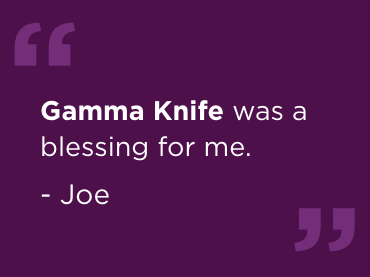The Challenge
Joe Stuckert of New Castle put his active lifestyle on hold when he was diagnosed with a hernia that required surgery. The 51-year-old software trainer typically kept busy traveling one or two weeks a month for work, as well as boating, waterskiing, and going to the gym in his spare time. Joe soon realized that the hernia he saw as a nuisance was a blessing in disguise.
Before his hernia surgery, Joe received a routine chest x-ray.
“They found a big circular thing on my lung,” Joe remembers, “and they sent me to a pulmonologist at UPMC immediately.”
“Everything happened so fast,” Joe says. “It was just about two weeks from the x-ray to my lung surgery.”
Surgery to remove tumors from Joe’s lungs was performed, but before Joe could begin chemotherapy, his doctors ordered a full-body scan to find out if the cancer had spread.
“That’s when they found lesions on my brain. I had metastatic lung cancer, stage 4,” Joe says.
Schedule an Appointment or Ask a Question
The Choice
Joe’s odds weren’t good: He was given only a slim chance of recovery. Luckily, Joe has always lived each day to the fullest.
“My philosophy from the beginning was I have it, I can’t change it, I’m in good hands, and if I live six months or 60 years I’ll be happy.”
Joe was given two treatment options. One option, whole-brain radiation, might work over time but could have severe side effects.
“At my age and health level I didn’t want to face short- and long-term memory loss or long-term side effects of full-brain radiation treatment,” Joe says.
As an alternative, Gamma Knife® radiosurgery would be much less invasive and would eliminate the tumors more quickly. Joe chose the Gamma Knife, with the hopes of returning to his full, energetic life.
The Solution
Joe came to Pittsburgh to see Dr. John Flickinger, a UPMC radiation oncologist, and Dr. Dade Lunsford, the Director of the Gamma Knife program at UPMC. It is the nation’s leading provider of Gamma Knife procedures, and UPMC physicians have treated more than 12,000 patients since 1987.
Within days of his initial assessment by Dr. Flickinger, Joe’s first treatment began. Joe’s head was fitted with a stereotactic frame by the surgical team, and he underwent a high-definition MRI scan to pinpoint the locations of his brain tumors. Drs. Lunsford and Flickinger then devised a precise plan to inactivate and ultimately destroy the tumors by bombarding them with multiple highly focused radiation beams, while avoiding Joe’s healthy brain tissue. Dr. Lunsford used the frame to position Joe’s head within a large, helmet-like device with 192 small openings designed to focus the x-ray beams directly on the tumors. This sets off a radiobiological response that makes the tumors shrink over the course of several weeks.
Joe was able to leave the hospital that day. Over the next two years, when his doctors found two new brain lesions, he underwent Gamma Knife surgery again. On each occasion, the only marks on Joe were small incisions on his scalp where the stereotactic frame had been attached, which healed within days.
“The Gamma Knife was the easiest part of my cancer treatment,” Joe recalls. “Each time I went home the same day, and one day I even went to the gym!”
The Results
Four years later, Joe’s scans have been normal and he seems to have beaten the odds.
“Gamma Knife was a blessing for me,” Joe says. “I kept working as a software trainer, even during chemo and radiation unless I was really sick, to keep my routine as normal as I could.”
Part of Joe’s routine is keeping his sense of humor.
“My oncologist and I get in arguments sometimes about how active I was during treatment. She says I have to take it easy. I tell her, ‘Maybe you need to tell your other patients to get up and do something!’ ”
Our patient stories profile a number of patients who have had minimally invasive brain surgery at UPMC. Although everyone's care experience is unique, we hope that sharing these stories will help other prospective patients and their families better understand these procedures and their potential benefits.
Joe's treatment and results may not be representative of all similar cases.



















